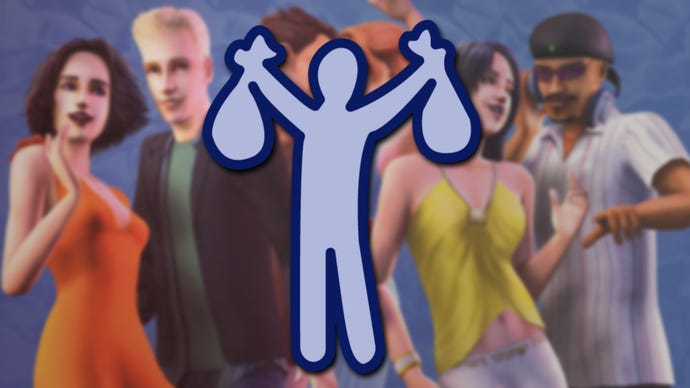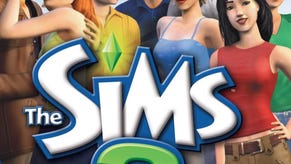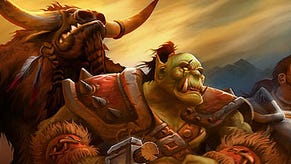The best Sims game turns 20 today, calling forth a wave of warm nostalgia in the face of the franchise's uncertain future
The Sims 2 was released on this day in 2004, so if you're interested in reading this, chances are you're old like me.
Like many children, I grew up playing whatever video games I could get my hands on, my early choices dictated largely by parental preference and what the owner of the sole computer shop in my rural hometown chose to stock. The original Sims was the first game I ever successfully lobbied to own: actively seeking it out — and my subsequent fascination upon actually getting to play it — was, with hindsight, a fairly significant early expression of my emerging personality as a 10-year-old. As you can probably imagine, therefore, four years and countless mercifully-untracked in-game hours later, I was about as hype for The Sims' first-ever sequel as a geeky 14-year-old can get. Read: extremely. And because life is nice sometimes, I was destined not to be disappointed.
All of which is to say that there's no denying the nostalgia factor at play here; but I still maintain that The Sims 2 was the high point of the franchise. And, while this isn't an uncontested view, it's not exactly a niche opinion either: it's a stronger candidate for the title than The Sims or The Sims 4, certainly; and while The Sims 3 has a lot of fans these days, the room temperature read seems to suggest it's an even split at best.
The Sims 2 wasn't criticism proof on launch, of course, even if it came in for less flack overall than its eventual sequels. For players of the original game, this was their first experience of going back to a base game without the add-ons they'd spent the previous four years (and a significant chunk of money) collecting to expand their experience. The conspicuous absence of features like pet ownership, vacations, fame, magical powers, and urban nightlife — all of which had been added through the original game's seven expansion packs — came in for a measure of criticism, especially once it became obvious that EA and Maxis fully intended to sell almost all of those features again for The Sims 2 in what amounted on a basic level to remakes of said EPs.
But The Sims 2 nevertheless avoided the harsher backlash that would characterise both The Sims 3 and The Sims 4 for the duration of their lifespans, for a number of reasons; a key one being its genuine innovation.
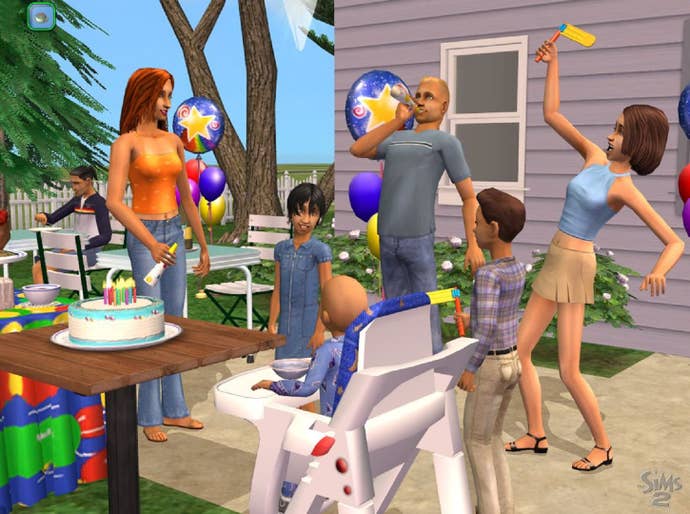
The Sims was a revolutionary life sandbox upon its launch in 2000, and The Sims 2 was the only one of its sequels to innovate so drastically as to be only barely recognisable as an iteration on its predecessor. The Sims still deserves its place in video game history for proving the concept, but The Sims 2 had both a bigger budget and better technology to work with, and so introduced many features to the series that feel so essential it's hard to believe we spent four years prior playing without them.
The Sims 2 was the first game in the franchise where time passed seriously and had consequences for the characters: ageing, genetics, generations, and even days of the week were all introduced in The Sims 2 base game. In The Sims original, death was only ever a consequence of misadventure and fairly easy to avoid. In The Sims 2, it was an inevitability, adding a much deeper layer of time management to a game that I'd argue was always a pretty hardcore management sim anyway.
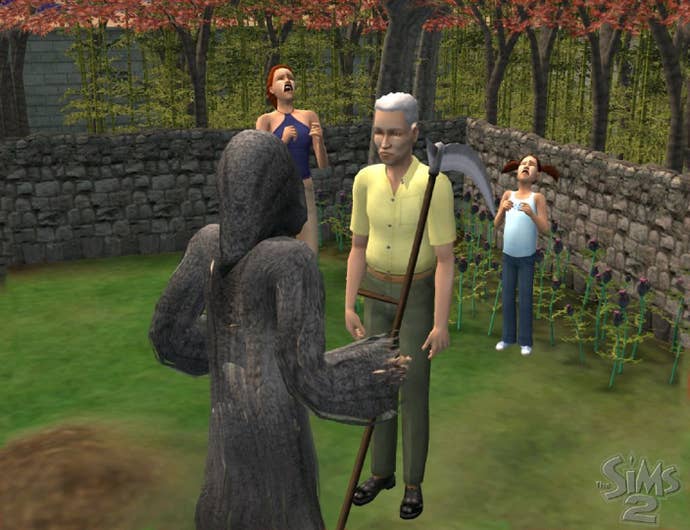
This dovetailed immaculately with the introduction of Aspirations: a brand-new gameplay feature giving Sims the choice between a few basic directions they wanted to see their brief simulated lives take. The options were to dedicate themselves primarily to the pursuit of romance, wealth, family, knowledge, popularity, or (in a later expansion pack) uncomplicated leisure. Succeeding in making those dreams happen would make-or-break whether an elderly Sim heading off for their final appointment with the Grim Reaper considered theirs to be a life well-lived or wasted on dead-ends.
Some long-time Simmers hold the view that the original The Sims never truly received a sequel, because The Sims 2 added so many new dimensions — indeed, a new defining philosophy — to the very concept of the life sim as originated by its predecessor. By comparison, The Sims 3 and The Sims 4 are both far more modest iterations on The Sims 2: each with a central set piece (open worlds for 3, emotions for 4) that proved both controversial among contemporary players and nowhere near as revolutionary in terms of gameplay as the seismic change that was The Sims 2's complete overhaul of the core goals of the whole simulation.
Open worlds in 3 were a winning idea in theory, but the stability issues they caused meant that even enthusiastic fans often couldn't actually play the game; while the idea of Sims experiencing ever-fluctuating emotional states in 4 turned out to be far less game-changing than it sounded on paper. But that initial switch from a relatively static needs-management sandbox to a life sim that actually, in a very real way, simulated life? It's no wonder it still stands out all these years later.
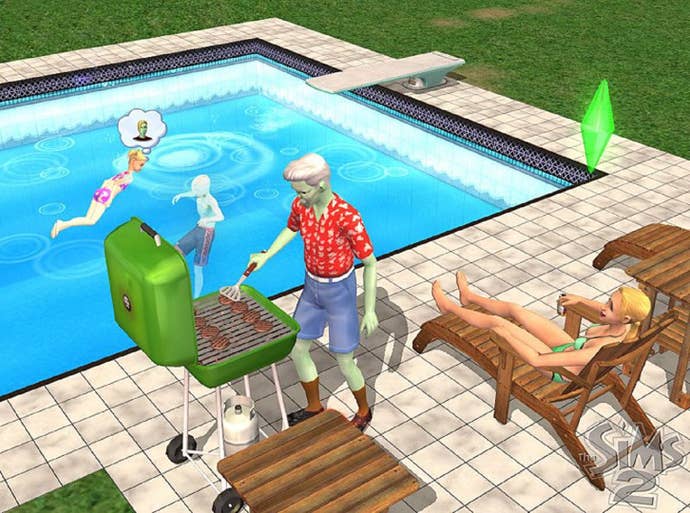
The looming spectre of mortality wasn't all that The Sims 2 brought to the table, of course. Despite those not-unfounded criticisms of repackaging and selling back add-on content from the original game, from the beginning it did genuinely incorporate many of the quality-of-life improvements introduced in the old game's expansions. TS2's base game brought across the possibility for Sims to host house parties, visit community lots, and live across multiple neighbourhoods, while massively expanding their options for social interactions and food and clothing choices, all accompanied by a far more detailed character customisation suite than the off-the-peg skins offered in the original. It was also the first fully-3D game in the series and the most plot-heavy entry to date, with the base game alone being single-handedly responsible for many-if-not-most of the franchise's lore cornerstones.
Looking beyond the base game, The Sims 2's expansion packs would introduce staple concepts such as weather, universities, business ownership, and apartments — all now considered essential expansion pack themes (and thus easy wins when it comes to DLC sales) for any new gen of the franchise. And it also, for better or for worse, began the tradition of smaller add-ons for The Sims with the advent of stuff packs — which at least included a generous amount of content for their smaller price-tag, but which were nevertheless the obvious precursors for the micro-DLC practices seen on The Sims 3 Store or in The Sims 4's ever-growing horde of kits.
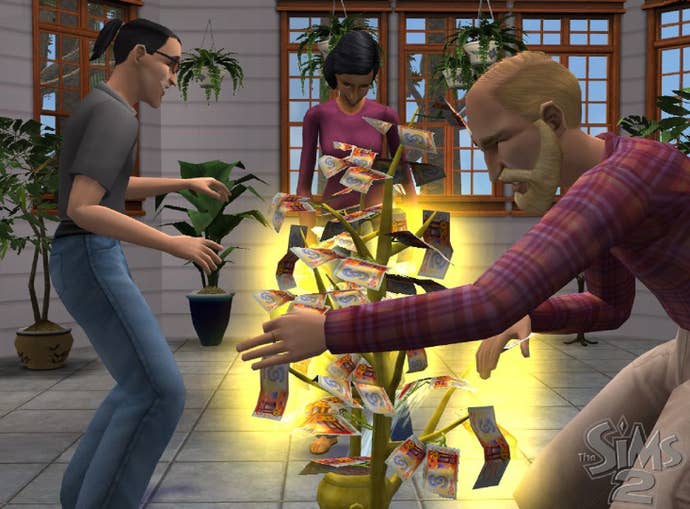
But on its 20th birthday, the most pertinent question about The Sims 2 is perhaps not what it did for the franchise but whether it's still worth playing — especially if, like many Simmers now, you were too busy not being born in 2004 to experience it when it was the new hotness.
My answer would be yes, but perhaps only in theory at this exact moment in time. The Sims 2 was briefly released digitally as The Sims 2 Ultimate Collection, containing all expansions and stuff packs, via EA's storefront Origin. But it was only available to players who could claim it for free by proving that they owned a boxed edition of the original base game, and only for the relatively brief period between August 2014 (when the collection came out to promote the release of The Sims 4) and October 2018 when it was discontinued entirely, only re-downloadable if you had the means and the presence of mind to add it your library during those four years.
It's still fairly cheap and easy to obtain second-hand physical copies of the game, but then you have to contend with the fact that the boxed versions were produced in 2008 at the very latest, and so are only optimised to run on PCs up to Windows Vista. While it's by no means an impossible task to get The Sims 2 running on a modern set-up, The Sims 3 and The Sims 4 both being available to pick-up-and-play at the press of a digital button make the technical barriers to entry to their lauded older sibling feel all that much higher.
While I'll defend The Sims 2's supremacy until my last breath, The Sims 3 and The Sims 4 are both very good follow-ups, worthy of being appreciated for their own unique spins on the idea and the quality-of-life improvements they bring. They're strong enough as successors, at least, that the convenience and ongoing support from EA for both titles mean it's probably a more attractive prospect to just play one of them instead, unless you're already a die-hard Sims 2 fanatic who will accept no substitutes. If you are, you're in luck, as there's still a very active support and modding community around TS2 even now; but it's not exactly a game you can just casually dip into in the way you can with its sequels. It's abandonware, basically, and so it takes a bit of work on the player's part to even reach the title screen.
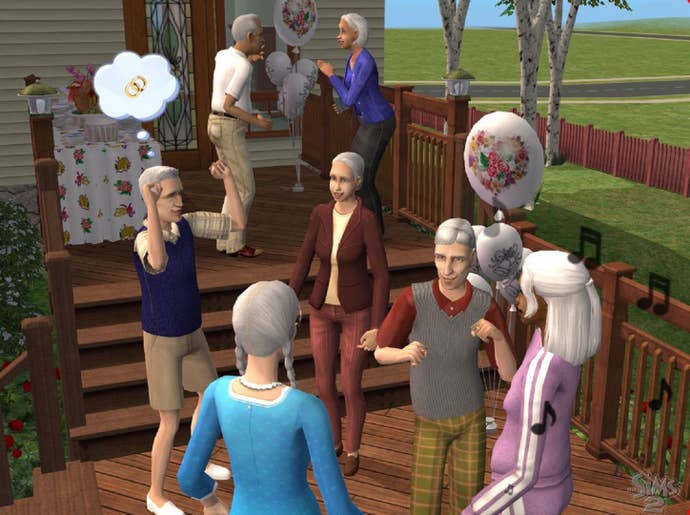
Of course, the utopian happy ending here would be for EA to re-enable support for The Sims 2 Ultimate Collection and begin selling it digitally — and heck, while we're at it, digitise The Sims Complete Collection so that the whole core franchise is preserved and readily available to modern players. It's not outside the realm of possibility; the franchise as a whole turns 25 in February of next year, and while 2024 has seen two other big Sims anniversaries go largely uncelebrated by EA, they have been vaguely hinting for a while about wanting to support multiple Sims titles concurrently going forward.
Could this cryptic suggestion mean they're planning to finally throw "retro" Simmers a bone? Truthfully, I have no idea; and I'm beginning to suspect maybe they don't either, given how production on Project Rene (a.k.a. The Sims 5) seems to have quietly slowed right down. But maybe that means it's actually the perfect moment for The Sims franchise to look to the past rather than the future for its elusive dream of a renaissance? And if it does, The Sims 2 is incontestably the perfect place to start.
